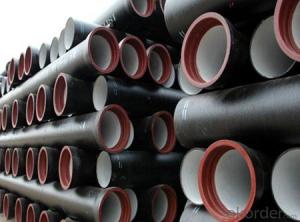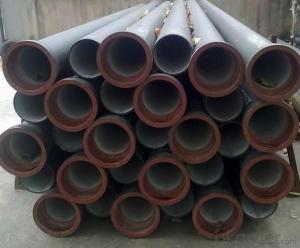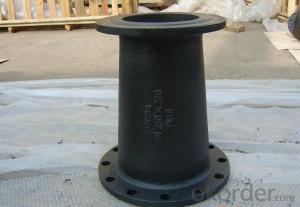Ductile Iron Pipe of China DN500 EN545/EN598/ISO2531
- Loading Port:
- China main port
- Payment Terms:
- TT or LC
- Min Order Qty:
- 25 m.t.
- Supply Capability:
- 200000 m.t./month
OKorder Service Pledge
OKorder Financial Service
You Might Also Like
1,Ductile Iron Pipe Description :
1) Pipes confirm to ISO2531,K9 class,T type joint,6m long,with inside cements lining conform to ISO4179, outside Zinc spraying(130g/m2) and bitumen coating(70μm) conform to ISO8179.
2) Pipe ends: Spigot and socket ends, with 100% SBR rubber gaskets accoding to ISO4633
3) we can do third party inspection according to customer's request.
4) Our products have been sold to many international market, such as Middle East and South East Asia and Africa.
2,Main Features of the Ductile Iron Pipe:
•High yield strength
•High tensile Strength
•High corrosion resistance
•Pressure Resistence
•Anti-corrosion
•Installation is convenient
•Satisfy the highest hygienic standards
• Chemical checking
• NDE after rough machining
• Mechanical testing after heat treatment
• Final NDE,dimension inspected
• Full Q.A document as per client request
• Quality: we have full set quality control system to guarantee the best quality.
• Inspection: inspect in house, all our products must be checked 3 times before packing
• In-house Foundry
• Third party inspection available upon requirement
• To be your preferred partner
3,Ductile Iron Pipe Images:
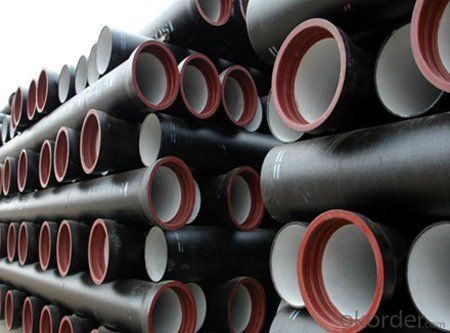
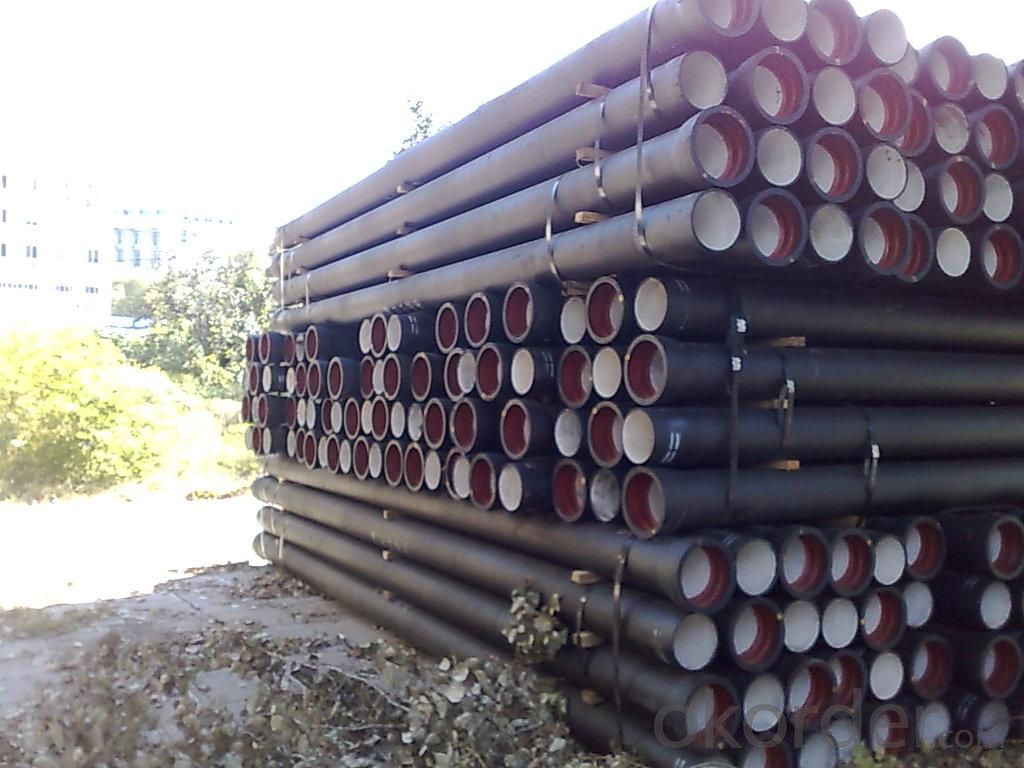
4. Ductile Iron Pipe Specification
Processing service: Beveling, Threading, Slotting, Cut-to length, Bends, Quench and Temper, Fabrication, Double-jointing and On-site assistance
Documentary: MTC, material certification,Origin certification, CI or PI,Test Report, export licence, handling order, B/L,insurance policy,shipping instructions, contract, packing list etc.
Specification& Payment terms
Internal lining: ductile iron pipes shall have an internal cement mortar lining in acc with ISO4179.
External coating: ductile iron pipes shall be externally coated with metallic zinc spray plus a further layer of resin painting to ISO8179.
Gasket: 100% SBR/NBR/EPDM rubber gasket in accordance with ISO4633.
Packing: ductile iron pipes from DN100 to DN300 be bundled with steel belts, others are in bulk.
Payment term: L/C, T/T.
Packing: In bulk vessel or in container
5.FAQ:
We have organized several common questions for our clients,may help you sincerely:
1.Q: Why would you choose ductile iron pipe rather than other pipe materials?
A:The reasons are obvious for that not only ductile iron pipe possesses the inherent strength and flexibility of ductile iron, combined with proven corrosion protection systems, but also the cost savings can be achieved from design to installation and commissioning.
2.Q:Why can you guarantee the inner of pipes can’t be corroded?
A: High alumina cement mortar lining and sulphate-resistant cement mortar lining. These two special linings are applicable to inner anti-corrosion for sewage pipes, improving resistance to erosion of the sewage components.
C
- Q:Can ductile iron pipes be used for wastewater reuse projects?
- Ductile iron pipes are suitable for wastewater reuse projects due to their various properties. Firstly, they possess high strength and durability, enabling them to withstand the pressure and load requirements of wastewater systems. Additionally, they exhibit outstanding corrosion resistance, a crucial factor in wastewater applications where the presence of chemicals and corrosive substances is common. Moreover, the smooth internal lining of ductile iron pipes reduces friction and enhances the flow of wastewater. This is essential for efficient transportation and distribution of wastewater in reuse projects. Furthermore, ductile iron pipes are renowned for their ease of installation and maintenance. They can be effortlessly connected using various joint options, facilitating quick and efficient installation. Additionally, their long service life reduces the necessity for frequent replacements and minimizes maintenance costs. In conclusion, the properties of ductile iron pipes make them a suitable option for wastewater reuse projects, providing strength, durability, corrosion resistance, smooth flow, and ease of installation and maintenance.
- Q:Are ductile iron pipes suitable for use in wastewater treatment plants?
- Yes, ductile iron pipes are suitable for use in wastewater treatment plants. Ductile iron has excellent corrosion resistance, high strength, and durability, making it ideal for handling the harsh and corrosive environment found in wastewater treatment plants. Additionally, ductile iron pipes have a long lifespan and can withstand the high-pressure demands of wastewater systems, making them a reliable choice for this application.
- Q:How do ductile iron pipes handle pressure surges in pumping stations?
- Ductile iron pipes are specifically designed to handle pressure surges in pumping stations effectively. The inherent strength and flexibility of ductile iron make it well-suited to withstand the sudden increase in pressure that can occur during pump start-up or shutdown. One of the key features of ductile iron pipes is their ability to absorb and dissipate energy. When a pressure surge occurs, the ductile iron pipes have the capacity to absorb the excess pressure and distribute it evenly throughout the pipe network. This helps to minimize the impact of the surge and prevent any potential damage to the pipes or the pumping station. Additionally, ductile iron pipes have a high resistance to impact and stress, which further enhances their ability to handle pressure surges. The pipes are manufactured using a unique process that imparts strength and durability, allowing them to withstand the forces exerted during pressure fluctuations without any significant deformation or failure. Furthermore, ductile iron pipes have a smooth internal surface, which reduces friction and turbulence within the pipe network. This smooth flow characteristic helps to mitigate the effects of pressure surges by allowing the water to move efficiently without creating additional stress on the pipes. In summary, ductile iron pipes are specifically engineered to handle pressure surges in pumping stations by absorbing and dissipating the excess pressure, withstanding the impact and stress, and promoting smooth flow. Their robustness and reliability make them an ideal choice for applications where pressure fluctuations are common, ensuring the longevity and efficiency of the pumping infrastructure.
- Q:Can the sealing ring of ductile iron pipe be reused?
- The sealing ring is hard to install and take off. I have been in this line for six years. I haven't seen it removed. The rubber ring itself is not expensive. It is not necessary to reuse it.
- Q:Are ductile iron pipes suitable for installation in areas with high groundwater contamination and soil erosion?
- Ductile iron pipes are generally suitable for installation in areas with high groundwater contamination and soil erosion. This is because ductile iron pipes are known for their durability, strength, and resistance to corrosion. They have excellent resistance to acidic and alkaline soils, making them suitable for areas with high groundwater contamination. Furthermore, ductile iron pipes have a high resistance to soil erosion due to their robust construction. They are designed to withstand various external forces, including pressure from the surrounding soil and potential movement caused by erosion. This makes them a reliable choice for installation in areas prone to soil erosion. However, it is important to note that while ductile iron pipes can withstand high groundwater contamination and soil erosion, proper installation techniques and maintenance practices should be followed to ensure their longevity and optimal performance. Regular inspections, proper backfilling, and appropriate protective coatings should be employed to maximize the pipe's lifespan. In conclusion, ductile iron pipes are generally suitable for installation in areas with high groundwater contamination and soil erosion. Their durability, strength, resistance to corrosion, and high resistance to soil erosion make them a reliable choice for such environments. However, it is crucial to follow proper installation and maintenance practices to ensure their longevity and optimal performance.
- Q:Ductile iron pipe converter, steel transition DN100 turn 100, what is the specific accessories name? Can you supply photos?
- Plastic steel conversion parts performance description: long name high density polyethylene is mainly used for buried water supply and gas transmission pipeline links, can effectively and closely linked pipe port, quality assurance, reasonable price and price.
- Q:What's the advantage of FCD50 ductile iron?
- Ductile cast iron pipes are called ductile iron pipes.
- Q:Do ductile iron pipes require concrete encasement for support?
- Concrete encasement is typically necessary for providing support to ductile iron pipes. This encasement offers extra stability and strength, safeguarding the pipes against pressure-induced shifting or collapsing. Furthermore, it aids in evenly distributing the load along the pipe's length and shielding it from external forces like soil movement or heavy vehicular activity. In addition to these benefits, concrete encasement helps reduce the likelihood of corrosion or damage caused by external impacts, thereby ensuring the long-lasting durability of the ductile iron pipes.
- Q:How are ductile iron pipes protected against internal corrosion caused by chemicals?
- To safeguard against internal corrosion caused by chemicals, ductile iron pipes implement various protective measures. Primarily, these pipes are equipped with either a cement mortar lining or an epoxy coating, creating a barrier between the water or sewage's chemical substances and the iron material. This barrier effectively prevents direct contact, thereby averting corrosion. Additionally, a corrosion-resistant polymer or bituminous coating is frequently applied to the pipes' exterior. This supplementary layer of protection shields the pipes from potential chemical exposure originating externally. Moreover, cathodic protection is a commonly employed technique to counter internal corrosion. Sacrificial anodes, typically composed of zinc or magnesium, are affixed to the pipes. Over time, these anodes undergo corrosion instead of the iron, sacrificing themselves to safeguard the pipes against chemical-induced corrosion. Furthermore, regular maintenance and monitoring play a crucial role in the prevention and rectification of corrosion issues. This entails routine inspections, cleaning, and prompt repair of any corroded or damaged areas. Overall, the integration of lining, external coating, cathodic protection, and maintenance practices ensures the comprehensive protection of ductile iron pipes against internal corrosion caused by chemicals. This prolongs their lifespan and guarantees the integrity of the pipeline system.
- Q:Can ductile iron pipes be used for water treatment plants?
- Yes, ductile iron pipes can be used for water treatment plants. Ductile iron pipes are often chosen for water treatment plants due to their durability, strength, and corrosion resistance. They can handle high-pressure water systems and are resistant to wear and tear, making them suitable for transporting treated water in large quantities. Additionally, ductile iron pipes have a long lifespan, which reduces the need for frequent replacements and maintenance, making them a cost-effective choice for water treatment plants.
1. Manufacturer Overview |
|
|---|---|
| Location | |
| Year Established | |
| Annual Output Value | |
| Main Markets | |
| Company Certifications | |
2. Manufacturer Certificates |
|
|---|---|
| a) Certification Name | |
| Range | |
| Reference | |
| Validity Period | |
3. Manufacturer Capability |
|
|---|---|
| a)Trade Capacity | |
| Nearest Port | |
| Export Percentage | |
| No.of Employees in Trade Department | |
| Language Spoken: | |
| b)Factory Information | |
| Factory Size: | |
| No. of Production Lines | |
| Contract Manufacturing | |
| Product Price Range | |
Send your message to us
Ductile Iron Pipe of China DN500 EN545/EN598/ISO2531
- Loading Port:
- China main port
- Payment Terms:
- TT or LC
- Min Order Qty:
- 25 m.t.
- Supply Capability:
- 200000 m.t./month
OKorder Service Pledge
OKorder Financial Service
Similar products
New products
Hot products
Hot Searches
Related keywords
